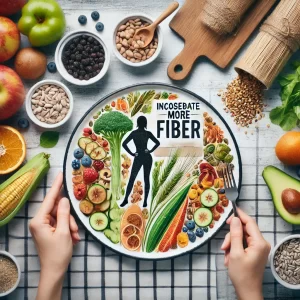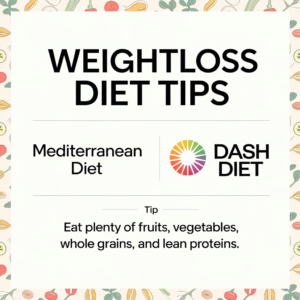How to Lose Weight with the Vegetarian Diet: A Step-by-Step Guide for Beginners
Introduction to the Vegetarian Diet
The vegetarian diet is a plant-based eating style that excludes meat, poultry, and fish, but often includes dairy products and eggs (lacto-ovo vegetarian). It’s a popular choice for people who want to improve their health, reduce their environmental impact, or follow a diet aligned with their ethical beliefs. Vegetarian diets are naturally high in fruits,  vegetables, legumes, and whole grains, which makes them an excellent option for weight loss and overall well-being. This guide will explore how the vegetarian diet works, its benefits, and tips for following a healthy vegetarian diet weight loss plan.
vegetables, legumes, and whole grains, which makes them an excellent option for weight loss and overall well-being. This guide will explore how the vegetarian diet works, its benefits, and tips for following a healthy vegetarian diet weight loss plan.
How the Vegetarian Diet Works for Weight Loss
Weight loss on the vegetarian diet is largely due to the emphasis on nutrient-dense, low-calorie foods like fruits, vegetables, whole grains, and legumes. These foods are packed with fiber, which helps to keep you full and satisfied, reducing the likelihood of overeating. The high volume of food you can eat on a vegetarian diet, combined with the lower calorie density of plant-based foods, makes it easier to create a calorie deficit, which is essential for weight loss.
Additionally, by cutting out high-calorie, fatty meats, and processed foods, vegetarians tend to consume fewer overall calories, which can naturally lead to weight loss. The vegetarian diet also helps regulate blood sugar levels, which prevents energy crashes and reduces cravings for unhealthy, calorie-dense snacks.
Key Foods in the Vegetarian Diet
- Fruits and Vegetables: Fresh, whole fruits and vegetables are the foundation of a healthy vegetarian diet. They are low in calories, high in fiber, and provide essential vitamins and minerals.
- Whole Grains: Whole grains like quinoa, oats, brown rice, and whole wheat provide complex carbohydrates and fiber, helping to stabilize blood sugar and promote long-lasting energy.
- Legumes: Beans, lentils, chickpeas, and peas are excellent plant-based sources of protein and fiber, making them a staple for vegetarians.
- Nuts and Seeds: Almonds, chia seeds, flaxseeds, and sunflower seeds offer healthy fats, protein, and essential nutrients like omega-3 fatty acids.
- Eggs and Dairy (if applicable): For those following a lacto-ovo diet, eggs and dairy provide additional protein, calcium, and other essential nutrients.
Benefits of the Vegetarian Diet for Weight Loss and Health
Following a vegetarian diet offers numerous health benefits, many of which are closely related to weight loss. Here are some key advantages:
1. Low in Calories and High in Nutrients
The vegetarian diet is naturally low in calories because it emphasizes plant-based foods like fruits, vegetables, and whole grains. These foods are nutrient-dense but low in calories, making it easier to maintain a calorie deficit while still providing your body with essential vitamins and minerals.
2. High in Fiber
Vegetarian diets  are rich in fiber, which promotes healthy digestion, regulates blood sugar levels, and helps you feel full longer. Fiber also plays a crucial role in weight loss by reducing overall calorie intake and promoting satiety.
are rich in fiber, which promotes healthy digestion, regulates blood sugar levels, and helps you feel full longer. Fiber also plays a crucial role in weight loss by reducing overall calorie intake and promoting satiety.
3. Reduces Risk of Chronic Diseases
A well-balanced vegetarian diet can help reduce the risk of chronic diseases such as heart disease, type 2 diabetes, and certain cancers. Plant-based diets are associated with lower cholesterol levels, improved blood pressure, and better heart health, all of which contribute to long-term weight management and overall well-being.
4. Sustainable and Environmentally Friendly
For those concerned about the environmental impact of their food choices, the vegetarian diet is a sustainable option. By reducing or eliminating meat consumption, vegetarians can reduce their carbon footprint, conserve water, and contribute to more sustainable farming practices. This diet aligns with both personal health goals and environmental values.
Potential Drawbacks of the Vegetarian Diet
While the vegetarian diet offers many benefits, it does come with some potential challenges:
1. Risk of Nutrient Deficiencies
Because the vegetarian diet eliminates meat, it can sometimes be challenging to get enough of certain nutrients, such as iron, vitamin B12, and omega-3 fatty acids. Iron from plant-based foods (non-heme iron) is less easily absorbed by the body than iron from meat, so vegetarians need to be mindful of their iron intake and consider supplements if necessary. Similarly, vitamin B12, which is primarily found in animal products, may need to be supplemented.
2. Processed Vegetarian Foods Can Be Unhealthy
While many people assume that all vegetarian foods are healthy, this isn’t always the case. Many processed vegetarian foods, such as meat substitutes, packaged snacks, and frozen meals, can be high in unhealthy fats, sodium, and added sugars. It’s important  to focus on whole, unprocessed foods to reap the full health benefits of a vegetarian diet.
to focus on whole, unprocessed foods to reap the full health benefits of a vegetarian diet.
Tips for Success on the Vegetarian Diet
To maximize your success on the vegetarian diet and achieve your weight loss goals, follow these practical tips:
1. Focus on Whole Foods
While it’s easy to find processed vegetarian options, the key to success on this diet is focusing on whole, unprocessed foods. These foods are naturally lower in calories and provide more nutrients compared to processed options. Build your meals around fresh fruits, vegetables, legumes, and whole grains to support healthy weight loss.
2. Prioritize Protein in Every Meal
Protein is essential for weight loss and muscle maintenance. Make sure to include a source of plant-based protein in every meal, such as beans, lentils, tofu, or quinoa. If you include dairy or eggs in your diet, these can also be excellent sources of protein.
3. Watch Portion Sizes
While many vegetarian foods are low in calories, it’s still important to practice portion control, especially with higher-calorie foods like nuts, seeds, and oils. Eating large portions of these foods can lead to excess calorie intake, which may hinder your weight loss progress.
4. Take Supplements for Key Nutrients
To avoid nutrient deficiencies, consider taking supplements for key nutrients like vitamin B12, iron, and omega-3 fatty acids. You can also include fortified foods, such as plant-based milks and cereals, to help meet your nutritional needs.
5. Plan Your Meals Ahead of Time
Meal planning is crucial for success on the vegetarian diet, especially if you’re new to plant-based eating. Plan your meals ahead of time to ensure you have balanced, nutrient-rich options available. This will help you avoid processed foods and make it easier to stick to your weight loss goals.
Scientific Evidence Supporting the Vegetarian Diet
Numerous studies have demonstrated the health benefits of a vegetarian diet. A study published in the journal Obesity Reviews found that individuals following a vegetarian diet experienced greater weight loss and improvements in BMI compared to those following non-vegetarian diets. The study also highlighted the positive effects of a vegetarian diet on cholesterol levels and cardiovascular health.
Another study published in the Journal of the Academy of Nutrition and Dietetics concluded that plant-based diets, including vegetarian diets, are associated with lower body weight and a reduced risk of chronic diseases such as type 2 diabetes and heart disease.
Who Should Try the Vegetarian Diet?
The vegetarian diet is an excellent option for individuals who:
- Want to lose weight while improving their overall health.
- Prefer a diet rich in fruits, vegetables, and plant-based proteins.
- Are looking for a sustainable, environmentally friendly way to eat.
- Want to reduce their intake of animal products for ethical or health reasons.
Who Should Avoid the Vegetarian Diet?
While the vegetarian diet is suitable for most people, it may not be the best choice for:
- Individuals with specific medical conditions that require higher protein or nutrient intake from animal products.
- People who find it challenging to meet their nutritional needs without meat or fish.
- Those who rely on processed vegetarian foods, which may not provide the necessary nutrients for long-term health.
Conclusion
The vegetarian diet is a powerful, plant-based approach to weight loss that offers numerous health benefits while supporting ethical and environmental goals. By following a vegetarian diet weight loss plan and focusing on whole, nutrient-dense foods, you can achieve sustainable weight loss and improve your overall well-being. Whether you’re motivated by health, ethics, or environmental concerns, the vegetarian diet provides a balanced, flexible approach to healthy eating.